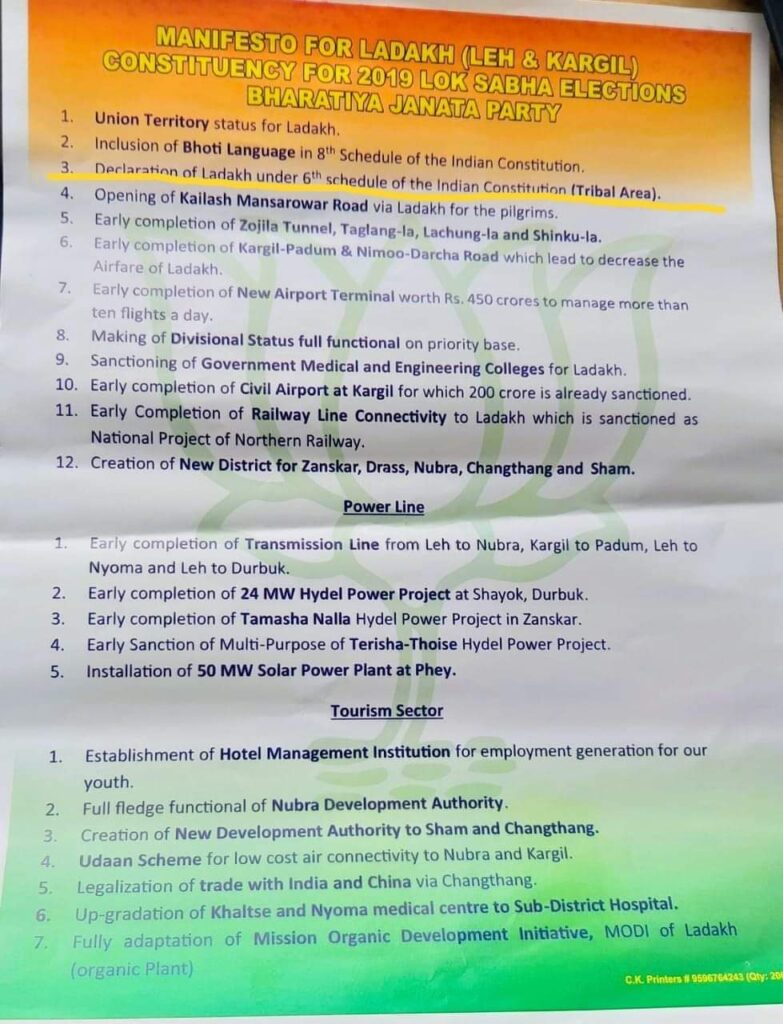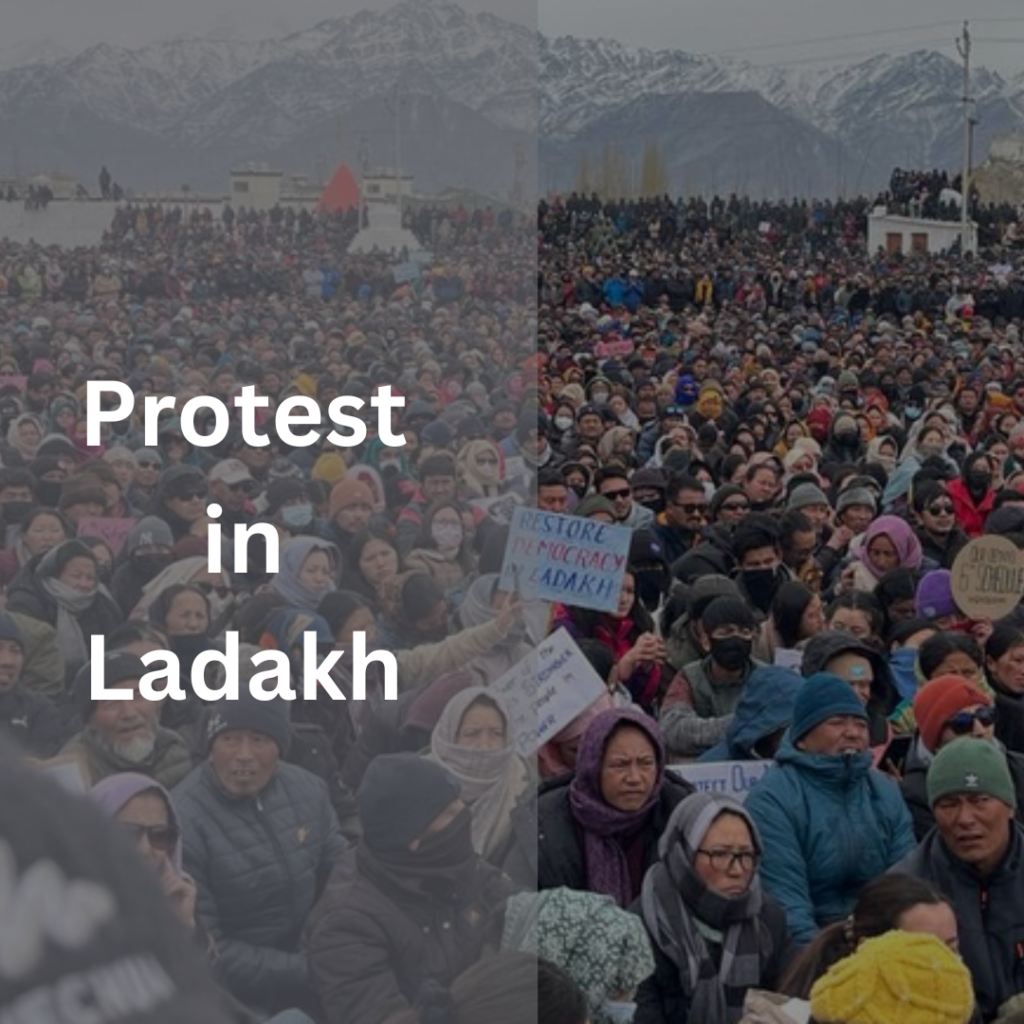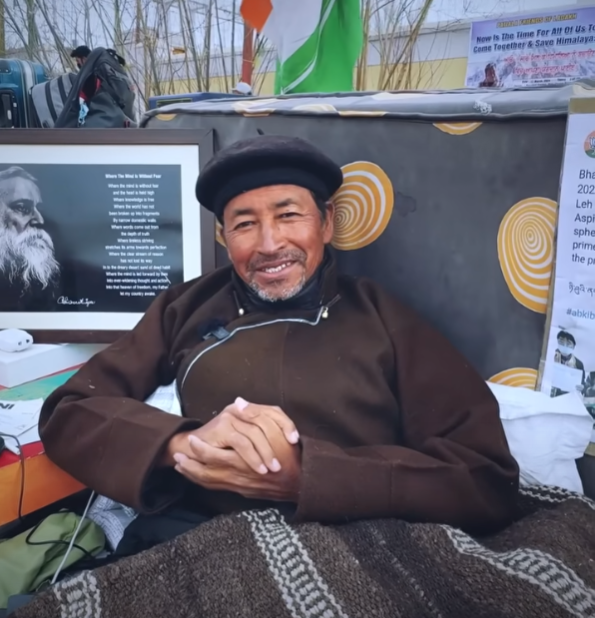Sonam Wangchuk: A Beacon of Change
Ladakhi environmentalist Sonam Wangchuk holds a 21-day climate change protest fast in Ladakh. This powerful act aims to raise awareness about the ecological threats facing by the Leh-Ladakh, an ecologically fragile Himalayan region.
Table of Contents
Why Are People Fasting in Ladakh, India?
Sonam Wangchuk started protest on 6th march 2024, with hundreds of people on subzero temperature at in the desolate, arid winter desert of Leh-Ladakh.
Wangchuk follow the Mahatma Gandhi’s path of non-violence and went for 21 days fast. People are using climate fasting as a powerful protest tool. Here’s a breakdown:
Lack of Democratic Representation:
- In 2019, a constitutional amendment revoked Article 370, which previously granted Ladakh a degree of autonomy as a part of Jammu state within India. This change in status transformed Ladakh into a union territory, resulting in a reduction in its level of self-governance and representation in the national parliament.
- Despite its significant land area exceeding 59,000 square kilometers and population of approximately 274,000, a distinct cultural identity, Ladakh possesses limited representation within the Indian Parliament. It holds only a single seat in the Lok Sabha (lower house). This lack of representation across both houses of Parliament, including no seats in the Rajya Sabha (upper house), raises concerns about the ability of Ladakhi voices to be heard on matters of national importance.
Demand for the 6th Schedule:
Sixth Schedule
The Sixth Schedule of India’s Constitution is like a special rule book for certain areas in the the country. These areas are home to many tribal communities, and the Sixth Schedule gives them extra rights. Here’s what it does:
- Creates local councils run by tribal people themselves
- Protects their unique culture and traditions
- Lets them follow their own laws along with national laws
Broken Promises:
- In the 2019 elections, the ruling BJP party promised to fulfill the demand for the 6th Schedule.
- However, no action has been taken so far, leading to disappointment and frustration.

- In 2022, local people and other political groups boycotted the Ladakh Hill Development Council elections.
- This boycott highlights their dissatisfaction with the current political situation.
Industrial encroachment
Protesters in Ladakh are raising concerns about several environment-related issues:
- Industrial Development: Multiple large-scale development projects are underway in Ladakh, including a geothermal power plant, a green hydrogen unit, and hydropower projects. Protesters worry about the potential negative environmental impacts of these projects on the fragile Himalayan ecosystem.
- Deforestation: Clearing land for electricity transmission lines is another concern. The loss of forest cover can contribute to soil erosion, disrupt animal habitats, and affect local weather patterns.
- Sustainable Energy Solutions: While some projects, like solar power, may seem positive, protestors advocate for a more comprehensive approach. They may question the environmental costs of large-scale energy transmission or the appropriateness of certain technologies for the region’s needs.
Demands of the Protests

Statehood for Ladakh:
Ladakh seeks to become a full-fledged state within India. This would grant them greater autonomy and control over their resources, allowing them to make crucial decisions regarding climate change solutions for the region. Wangchuk believes statehood is essential for effectively tackling the environmental challenges Ladakh faces.
Implementation of the Sixth Schedule:
The Sixth Schedule of the Indian Constitution protects the cultural and ecological rights of tribal communities. Wangchuk advocates for extending this schedule to Ladakh. He believes this is vital for safeguarding the unique cultural heritage of the Ladakhi people and ensuring the sustainable management of the region’s fragile ecosystem.
Action on Climate Change:
The climate change protest fast served as a powerful reminder of the immediate need for India to address the climate threats facing Ladakh. These threats include glacial melt, which is leading to water scarcity and disrupting traditional ways of life. Wangchuk demands concrete steps from the government to mitigate the impact of climate change on the region.
Escalating Action: Ladakh Protests Move Beyond Fasting
The climate fast in Ladakh, India, are gaining momentum with a call for a powerful new action: a border march. Here’s a breakdown of the latest developments:
March to the Border:
Climate activist Sonam Wangchuk has proposed a “border march” to highlight two critical issues:
- Land Loss: The march aims to showcase how much pastureland traditionally used by Ladakhi nomadic communities has been encroached upon by Chinese troops near the Indo-China border and the Line of Actual Control (LAC).
- Raising Awareness: The march will serve as a powerful visual demonstration, drawing national and international attention to the situation in Ladakh.
- Two Possible Dates: Depending on Wangchuk’s health after the climate fast, the border march is proposed for March 27th and April 7th.
- Nationwide Solidarity: In addition to the border march, Wangchuk has called for a day of protests and meetings across Indian cities on March 24th. This aims to garner broader national support for the Ladakhi cause.
This escalation in protest tactics signifies the growing urgency for the Ladakhi people. The border march highlights their concerns about land loss and the need for the government to address the situation at the border. It remains to be seen how these developments unfold, but it’s evident that the fight for Ladakh’s future is intensifying.


